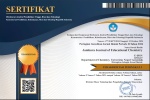Effectiveness of Implementing the Independent Learning Curriculum in Chemistry Learning Processes at High Schools in Makassar City
Abstract
Keywords
Full Text:
PDFReferences
Ahid, N., Hidayah, N., Maskur, R., & Purnama, S. (2020). Evaluation of curriculum 2013 with context input process product model in schools of Kediri, Indonesia. Phsycosocial, 24(7), 1573-1582.
Ananda, A. P., & Hudaidah, H. (2021). Perkembangan kurikulum pendidikan di Indonesia dari masa ke masa. SINDANG: Jurnal Pendidikan Sejarah Dan Kajian Sejarah, 3(2), 102-108. https://doi.org/10.31540/sindang.v3i2.1192
Aytan, T. (2016). Evaluation of the 2006 and 2015 Turkish Education Program in Secondary School Curriculum in Turkey in Terms of Critical Thinking. Journal of Education and Learning, 5(2), 38-46. https://doi.org/10.5539/jel.v5n2p38
Azizah. (2023). Efektivitas Penerapan Kurikulum Merdeka Belajar Pada Pembelajaran Bahasa Indonesia Kelas I Sd Islam Alghaffaar Mulyoagung, Kabupaten Malang. In Skripsi.
Caesaria, S. desi dan mahar prastiwi. (2024). Kemendikbud: Sisa 20 Persen Sekolah Belum Terapkan Kurikulum Merdeka. Retrieved Maret, 31, 2024, from https://www.kompas.com/edu/read/2024/03/31/144434071/kemendikbud-sisa-20-persen-sekolah-belum-terapkan-kurikulum-merdeka
Emda, A. (2017). Laboratorium sebagai sarana pembelajaran kimia dalam meningkatkan pengetahuan dan ketrampilan kerja ilmiah. Lantanida Journal, 5(1), 83-92. https://doi.org/10.22373/lj.v5i1.2061
Humas sulselprov. (2024). Pemerintah Provinsi Sulawesi Selatan Terima Penghargaan Anugerah Merdeka Belajar 2024 dari Mendikbudristek RI. Retrieved Juli 08, 2024, from https://bappelitbangda.sulselprov.go.id/detailpost/pemerintah-provinsi-sulawesi-selatan-terima-penghargaan-anugerah-merdeka-belajar-2024-dari-mendikbudristek-ri#:~:text=%22Saya%20mengucapkan%20terima%20kasih%2C%20di,Belajar%2C%22%20ungkap%20Prof%20Zudan
Iqbal, M. (2024). Implementasi program Merdeka Belajar di SMA Negeri 9 Kota Makassar. Jambura Journal of Educational Management, 4(1), 1-5. https://doi.org/10.33394/realita.v9i1.11105
Lestari, N. A. P., Kurniawati, K. L., Dewi, M. S. A., Hita, I. P. A. D., Or, M., Astuti, N. M. I. P., & Fatmawan, A. R. (2023). Model-model pembelajaran untuk kurikulum merdeka di era society 5.0. Nilacakra.
Manalu, J. B., Sitohang, P., & Henrika, N. H. (2022). Pengembangan perangkat pembelajaran kurikulum merdeka belajar. Prosiding Pendidikan Dasar, 1(1), 80-86. https://doi.org/10.34007/ppd.v1i1.174
Mawardani, S. I. (2023). Implementasi Kurikulum Merdeka Dalam Pembelajaran Sejarah Di SMA Negeri 5 Bandar Lampung Tahun Ajaran 2022/2023. In Skripsi.
Monika, L., kusumaning Ayu, L., Anisah, U. R., & Setiyono, J. (2023). Efektivitas pembelajaran Kurikulum Merdeka Belajar terhadap peserta didik di SMP Bangilan Tuban. Seminar Nasional Daring Sinergi, 1(1), 38-45. https://doi.org/10.59435/jipnas.v1i1.50
Mulyasa. (2004). Menjadi Guru Profesional. PT: Remaja Rosda karya. Bandung.
Murtihapsari, M., Achmad, F., Larasati, C. N., & Yogaswara, R. (2022). Penggunaan Model Pembelajaran Problem Based Learning Terhadap Minat Hasil Belajar Kimia. Jambura Journal of Educational Chemistry, 4(2), 64-69. https://doi.org/10.34312/jjec.v4i2.14050
Nurhasanah, A., Pribadi, R. A., & Nur, M. D. (2021). Analisis kurikulum 2013. Didaktik: Jurnal Ilmiah PGSD STKIP Subang, 7(02), 484-493. https://doi.org/10.36989/didaktik.v7i02.239
Pratikno, Y., Hermawan, E., & Arifin, A. L. (2022). Human resource "˜Kurikulum Merdeka'from design to implementation in the school: What worked and what not in Indonesian education. Jurnal Iqra': Kajian Ilmu Pendidikan, 7(1), 326-343. https://doi.org/10.25217/ji.v7i1.1708
Qurniawati, D. R. (2023). Efektivitas Pelaksanaan Kurikulum Merdeka Belajar. Proceeding Umsurabaya.
Rahma, S. N., & Hindun, H. (2024). Efektivitas Kurikulum Merdeka dalam Proses Pembelajaran di Tingkat Sekolah Menengah Pertama. Reduplikasi: Jurnal Penelitian Pendidikan Bahasa Indonesia, 3(2), 1-14.
Rohimajaya, N. A., Hartono, R., Yuliasri, I., & Fitriati, S. W. (2022). Kurikulum 2013 dan kurikulum merdeka dalam pembelajaran bahasa Inggris untuk SMA di era digital. Prosiding Seminar Nasional Pascasarjana, 5(1), 825-829. https://doi.org/10.32897/jiim.2023.1.2.2076
Rumape, O., Adjami, E. N. F., Sihaloho, M., & Iyabu, H. (2024). Identifikasi Pemahaman Konsep Siswa pada Materi Titrasi Asam Basa. Jambura Journal of Educational Chemistry, 6(1), 71-76. https://doi.org/10.37905/jjec.v6i1.23392
Samsuddin, A. (2023). Implementasi Kurikulum Merdeka Belajar di SMA Negeri 1 Tanjung Jabung Timur.
Sari, T. V. (2024). The Implementation of The Merdeka Curriculum in Learning English in Senior High School: Case Study. Jurnal Onoma: Pendidikan, Bahasa, Dan Sastra, 10(1), 28-35. https://doi.org/10.30605/onoma.v10i1.3047
Sekretariat GTK. (2019). Mengenal Konsep Merdeka Belajar dan Guru Penggerak. Retrieved November 25, 2019, from GTK Kemendikbud | 2023 (kemdikbud.go.id)
Shandi, S. A. (2018). Analisis Implementasi Manajemen Pendidikan Jasmani Berdasarkan Kurikulum 2013 Sekolah Menengah Atas di Kota Bima. Jurnal Pendidikan Olahraga, 8(1), 10-18.
Suyanto, S. (2018). The implementation of the scientific approach through 5Ms of the revised curriculum 2013 in Indonesia. Cakrawala Pendidikan, 37(1), 22-29. https://doi.org/10.21831/cp.v37i1.18719
Uthami, E. T., Salsabila, R. R., Ilmi, R. N., & Pandini, T. I. (2023). Analisis Problematika Kurikulum Merdeka pada Mata Pelajaran Kimia di Sekolah Menengah Atas. ULIL ALBAB: Jurnal Ilmiah Multidisiplin, 3(1), 102-108.
Wulandari, I. G. A. A. (2020). Implementation of the 2013 curriculum based on a scientific approach (Case Study at SD Cluster II Kintamani). International Journal of Elementary Education, 4(3), 422-430. https://doi.org/10.23887/ijee.v4i3.28172
Yunita, Y., Zainuri, A., Ibrahim, I., Zulfi, A., & Mulyadi, M. (2023). Implementasi kurikulum merdeka belajar. Jambura Journal of Educational Management, 16-25.
DOI: https://doi.org/10.37905/jjec.v6i2.25325
Refbacks
- There are currently no refbacks.
Editorial Office

|
Department of Chemistry, Universitas Negeri Gorontalo |

|
E-mail: [email protected] |

|
|

|
Jambura Journal of Educational Chemistry (p-ISSN: 2655-7606 | e-ISSN: 2656-6427) by Department of Chemistry Universitas Negeri Gorontalo. This work is licensed under a Creative Commons Attribution 4.0 International License. Powered by Public Knowledge Project OJS |










